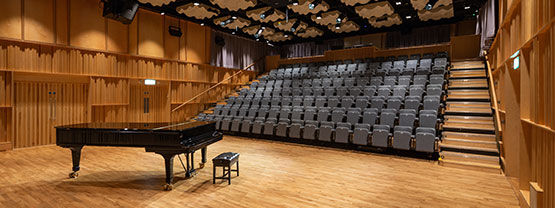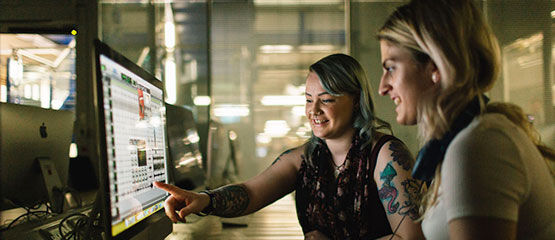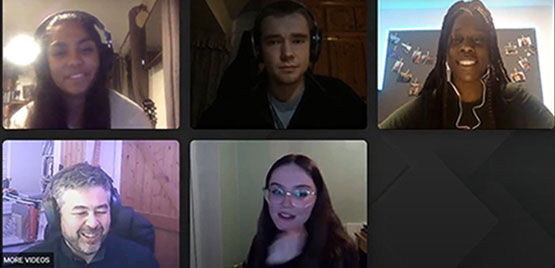If you love technology and music, in whatever shape that might be, then a degree in Music Technology or Sound Engineering and Production could be perfect for you. But before you decide on what course to apply for there are some things about the courses that you should know to help your decision.
If you choose to study a degree in sound or music with us, you'll be exposed to a range of different modules and have the chance to fully explore the subject to find what area you want to specialise in when you graduate. Our courses have evolved to give students skills that are in demand by industry - so you can expect to learn things like game audio, acoustics and recording.
We asked four students across our Music Technology and Sound Engineering and Production BSc (Hons) degrees (Oyin, James, Mia and Deepali) how the courses changed their career aspirations and what they have enjoyed most about the courses.
Oyin, Mia and Deepali all study the Music Technology degree and James studies Sound Engineering and Production.
What did you want to do as a career before starting your degree?
James – Before starting the course, I wanted to work in live sound and saw myself in event production. I have always loved playing music and performing at concerts, and during school I was involved with setting up school concerts and studied music at GCSE.
Mia – Although I always had an interest in music, I knew I was not a performer and saw myself in a studio work and production. However, within a few weeks of starting on the course I realised there was so much more that I could do with a science degree and apply it to whatever area I wanted to go in.
Deepali - Before starting the course, I wanted to work in a studio to do music production, because it was the only career I really knew about. But the course is so broad that I have learnt so much more than I thought I would – I have even learnt about live sound which is not actually part of my Music Technology degree but because of the two courses on offer here you have the chance to learn about both if you wanted to.
Oyin – I have always had a strong background in music, and at one point thought I would apply to a conservatoire. But through my GCSE Music I realised that I preferred composition and production to performing.
What is the best thing about the course?
Deepali – The staff are all really passionate and have so many great connections. I have always loved the theatre but wasn’t sure what I wanted to do. I mentioned this to my lecturer, Roy Priest, and he put me in touch with the Sound Engineer at the Royal Shakespeare Company and I had the opportunity to do a full tour, use some of the kit and record live sound there and from then I decided that was what I wanted to do. Also, Ben Weatherill is a live sound genius and has provided me with mentor support on my projects and gigs.
Oyin – I love how varied the course is, which is the reason why I chose it. From studying the range of modules, I found that I really enjoyed the acoustics and this is something now I am looking into doing as a career – something I had never considered before the course. Also, the course has developed ‘special interest groups’ that run weekly across a range of areas including electronics, live sound, research and acoustics, and anyone can join to find out more about something they are interested in. They invite guest speakers from industry, which is a great opportunity to learn more and network.
James – I love how experienced and knowledgeable the staff are having worked in the various sectors themselves. All the lecturers are there to develop your skills in whatever you want from networking, live sound to game audio and studio work.
What is it like to study alongside the Royal Birmingham Conservatoire?
Mia - I didn’t know what a conservatoire was before but it has been a huge advantage that I wouldn’t have had elsewhere. It allows you to meet and work with technicians, professional composers, musicians and actors whenever you need and you can use them to record. Not only do we have the benefit of recording with professionals but we can do it in professional studios and using industry-standard facilities.
Oyin – One of the great things about studying this course alongside a conservatoire means that whenever you need a good musician to record you can just go into where they are recording and record them. Also, there are so many different venues within the conservatoire such as the Eastside Jazz Club, Recital Hall, Organ Studio, Labs and Bradshaw Hall that has great internal and external performances, which gives us the opportunity to record shows and support with live sound.

What did you do for your placement year?
Deepali – My placement year fell through during the first lockdown due to covid, but instead of work coming to a halt I found myself involved with virtual theatre shows and using the science skills from my degree to develop software. That is the great thing about the course – it really prepares you for the evolving music industry and you will leave with skills to go into a range of careers, not just the traditional routes!
James – I did my placement year in live sound and my very first job was working for the Birmingham City Football Club Player’s Awards. I then went on to other jobs such as Lichfield Proms in the Park, National Memorial Arboretum and many conferences. My time on placement also allowed me to develop other live event skills such lighting, staging and event production. The placement company offered me a graduate job as Operations Technician and Production Assistant.
What extracurricular activities are you involved with?
James – As part of the ‘special interest groups’ that the department runs, I help teach first years who don’t have a background in live sound and want to get involved in it. I am also a member of the Live Sound Society and assist in the running of events. Outside of live music, I teach Ballroom and Latin Dancing and play flat green bowls at County level.
Oyin – I play for women’s football team, which I really enjoy and have weekly training sessions and I am a member of afro-Caribbean society. Both societies are great for meeting new people from a range of different backgrounds and usually do meet and greet events and game nights.
Deepali – Last year I ran the rock climbing society as Vice President, which I have always loved since I was young so I was very excited that BCU had this society! I found that I developed great leadership and organisation skills from this. I needed this to be able to prepare myself and manage my time around the course, a part-time job and leading the society. Societies are also a great way to network and meet new people in the music world.
Mia – I decided to volunteer with a great company called Action, who provide weekly sessions to underprivileged kids in schools. I spend one hour of my week supporting in schools and through this secured a job at BCU in the literacy team and go out to schools to tutor literacy in kids who have lower reading ages than they should to help their development. This has really helped to develop my people skills and develop professionally in an area that I enjoy.
Has the course changed what you want to do for a career?
Mia – It definitely has! Before the course, I thought that I wanted to work in a studio or production, which I think is a shared ambition with many students on the course. Now in my final year, I am hoping to go into the audiology world and be a Paediatric Audiologist, which is something I discovered from my audiology modules. I didn’t know anything about it before starting the course but because of the variety of what we learn you can take your area of interest and make it into a career.
Oyin – Before the course I also thought I wanted to work in a recording studio, but I have loved all of the acoustics elements of the course so am now hoping to go into a job in the acoustic industry.
James – I am still keen to take my dream job in the live sound industry and have enjoyed learning about the industry on my course and have all the skills ready to start a career now.
Deepali – Yes, before I thought I wanted to work in a recording studio, but through learning more about live sound and gaining experience with the conservatoire and Royal Shakespeare Company I now know that I want to work in a theatre in live sound, which is something I would never have imagined doing before.
You can watch the full conversation with our students here.

Study a degree in Music Technology or Sound Engineering
Do you have a passion for music and technology? Study a degree in Music Technology or Sound Engineering and Production to kick-start your career in this exciting industry!






